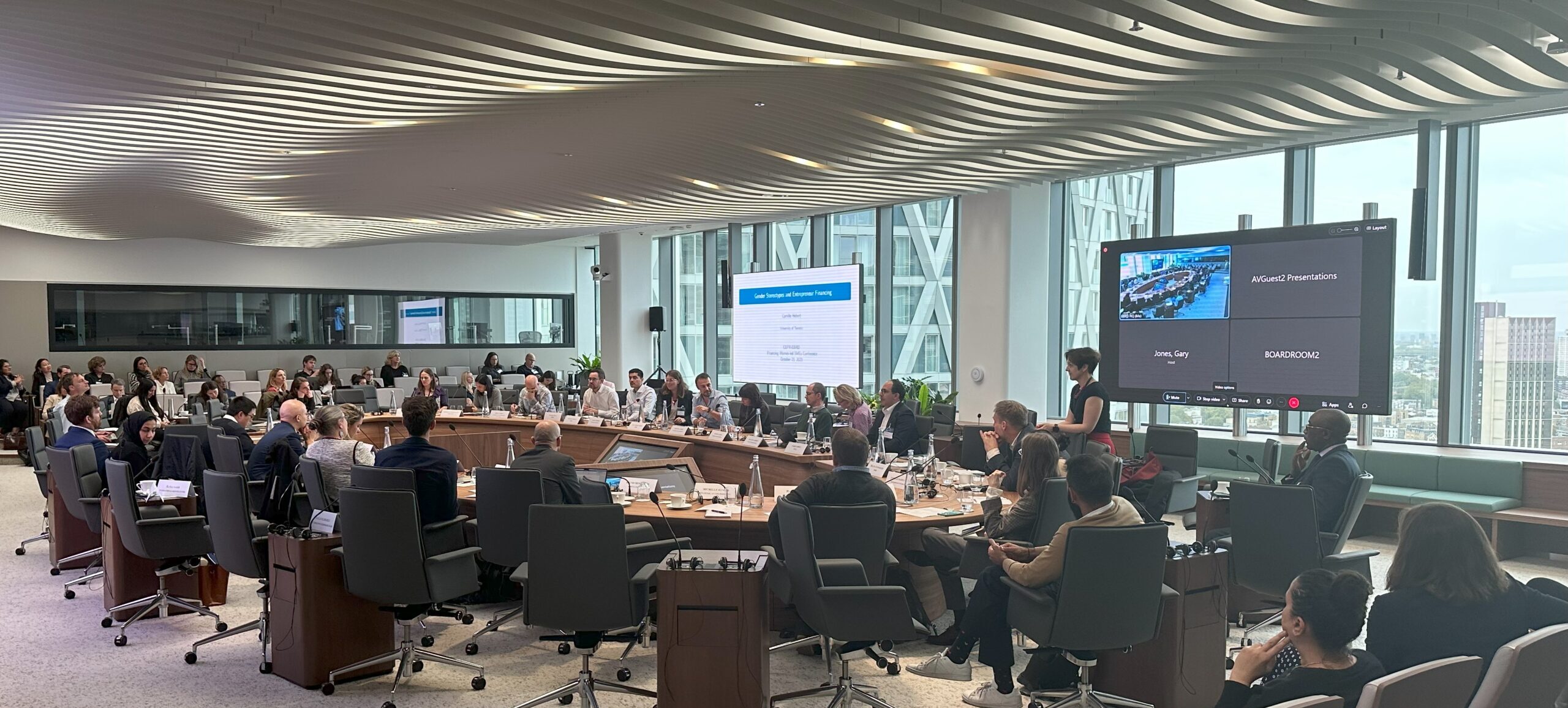Insights from the EBRD, We-Fi, CEPR Research Conference:
“Financing Women-led SMEs”
How can rigorous evidence be more effectively applied to project design and policy making to improve impact on women-led SMEs? We-Fi co-organized a two-day research conference together with the European Bank for Reconstruction and Development (EBRD) and the Centre for Economics Policy Research (CEPR) to address this question. Hosted at the Headquarters of EBRD in London, the conference brought together academics, practitioners, and policymakers from around the world to discuss new evidence on “financing women-led SMEs”.
The conference included a keynote from the United States Agency for International Development (USAID) Chief Economist and founder of Innovations for Poverty Action (IPA), Dean Karlan, and evidence insights from eight research papers on the impact of loans, gender biases in investment and lending, access to markets and networks, and regulatory policies and institutional practices. The academic sessions were complemented by a session on sex-disaggregated data, a policy-making discussion, and a matchmaking session, co-organized with the International Growth Centre (IGC), for researchers and practitioners who want to work together on future research.
Some key insights from new evidence on women-led SMEs presented at the conference include:
- Gender biases in finance for male-dominated vs. female-dominated sectors: In a study on the gender funding gap in France, Camille Hebert from University of Toronto found that women are 33% less likely to use venture capital in male-dominated sectors but are equally likely compared to men to use venture capital in female-dominated sectors. Demand-side factors (pipeline of female entrepreneurship) can only explain 1/3 of the gender gap in male-dominated sectors, 2/3 remain unexplained.
- Covid impacts on loans: Patricia Yañez-Pagans presented a recent study from the Inter-American Development Bank (IDB) and IDB Invest, supported by We-Fi, which explores the impact of government-guaranteed Covid-19 loans on access to credit and earnings. Results show gender differences in the access to liquidity – while men-led MSMEs increased commercial liquidity by approximately 30%, women-led MSMEs experienced an increase of only 13%.
- Effects of consortia on exports: Florian Münch presented fresh experimental evidence from Tunisia on the power of consortia, which might be cost-effective way to leverage collective knowledge. At midline, although no effects on exports could be identified yet (since this may take some more time to manifest), 2/3 of women entrepreneurs decided to become a member of a consortium and data show that they improved their entrepreneurial confidence, management practices, and profits.
A key takeaway from the conference was the strong appetite and opportunity to better enable research-practitioner collaboration and create links between research and operations. The following points were highlighted:
- Better coordination and alignment: There is not only the urgent need for more studies on women-led SMEs, but also for more effective coordination mechanisms to steer new research in a common direction. Moreover, the feedback loops, which result from improved research-practitioner coordination, are critical to ensure that research addresses the most pressing evidence gaps and that research findings can be effectively applied to practice. This includes more accessible research, which speaks to a wider audience and more meta-analyses to synthesize and analyze existing evidence. Such studies can be particularly valuable for practitioners and policymakers.
- Engaging early and often: Practitioners and policy makers often find it difficult to find and access rigorous academic research. On the other side, researchers often struggle to access data from financial intermediaries or international institutions. We need to create the space and opportunities to engage and share data and information at multiple points of engagement, not only when research is complete, but at the design and interim phases to make sure application needs are considered and available datasets utilized.
This research conference served as a launching pad for We-Fi’s research agenda which aims to catalyze efforts to create new evidence in the areas of debt financing, digital finance, blended finance, bundled services (combining capital with training), and sex-disaggregated data. There are still many evidence gaps concerning women-led SMEs in emerging economies and We-Fi leverages partnerships to enable the critical mass of research needed to generate insights, which can be applied by policy makers and practitioners to support women entrepreneurs more effectively.
We-Fi is looking to continue addressing these evidence gaps, sharing knowledge, and engaging partners on this important journey. We hope you will join us.
Please contact Felicia Siegrist (fsiegrist@worldbank.org) and Farid Tadros (ftadros@worldbank.org) for more information on We-Fi’s research agenda and knowledge work.

